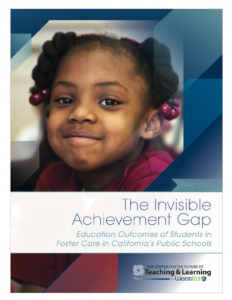
State-level data has an important role to play in motivating large scale system reform for the youth we serve.
In California and Arizona, we supported the production of Invisible Achievement Gap reports that merged state-level education and child welfare data to paint a picture of the educational outcomes of students in foster care. The California Invisible Achievement Gap: Education Outcomes of Students in Foster Care in California’s Public Schools, funded by the Stuart Foundation and authored by Vanessa Barrat and BethAnn Berliner at WestEd, represented the first-ever education snapshot of California’s K-12 students in the foster care system. It compared the educational outcomes of foster youth to other at-risk subgroups, and found that foster youth constituted an at-risk subgroup that was distinct from low-SES students. Foster youth were more likely than other students to change schools during the school year, more likely to be enrolled in the lowest-performing schools, had the lowest participation rate in California’s statewide testing program, had an achievement gap in statewide testing results, and had the highest dropout rate and lowest graduation rate.
We also facilitated the development of Arizona's Invisible Achievement Gap: Education Outcomes of Students in Foster Care in the State's Public Schools, was modeled after the California report and examined education and child welfare data obtained from Arizona's state-level agencies. It similarly found that Arizona students in foster care persistently underperform academically as compared to their classmates. It showed that students in Arizona’s foster care system trail all other students, including those identified with academic risk factors such as low socioeconomic status, limited English language proficiency, and disabilities.
Both reports have played a key role in our efforts to educate partners about the educational needs of students in foster care, and to inspire these partners to work together for change. As we move ahead in our work, we will continue to look for opportunities to facilitate research using state-level data to inform our and other stakeholders' work supporting youth.
info@foster-ed.org
1212 Broadway, Suite 600
Oakland, CA 94612